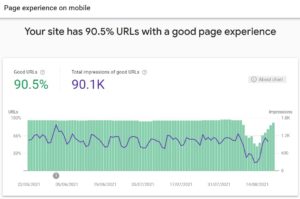Just like any other performance check, an
What does an SEO audit actually do?
An
To be effective an audit must cover a diverse range of areas including:
- Technical
SEO - Content – both written and visual
- Backlinks
The best audits will also provide suggestions for how to improve weaknesses, plus areas of opportunity not yet explored. It will also present recommendations in order of importance, as it may be that a small tweak could vastly enhance your Google ranking, whereas a huge one might satisfy your ego to be 100%
It’s important to utilize the best SEO audit tools to give you the best chance of conducting an audit for your site.
The technical components
Firstly, including a technical
Even if your rankings are great, if your titles don’t say the right things, your search position might not convert into actual visitors, as there could be a low click through rate, meaning potential visitors choose a competing website instead.
Since the summer of 2021, page speed is more important than ever. It is part of Google’s Page Experience Algorithm Update which also gives more benefit to mobile friendly and secure websites.
The easiest way to check the page speed and mobile friendliness of multiple pages simultaneously is to register with Google Search Console. Then look at the Page Experience, Core Web Vitals and Mobile Usability menus. This will identify common errors and pages that are too slow.

Anything you can do to improve your conversion rate will also help your sales. Google track how long visitors spend on your site. An additional benefit is as visitors placing orders visit more pages and spend longer, if you increase conversions, you also improve your
Content review
An on-page audit assesses the quality of the content on your website, including how
Some content aspects also fall into UX and apply to the entire site – is the navigation user-friendly? Can visitors easily find out how to contact you, or information about who you are? Does content that appears on every page serve a purple?
Other content aspects apply to each page individually. A simple way to algorithmically measure how good the content is for any one page is to divide the average time on page by the number of words. Compare this to other similar pages (e.g. other blogs or product pages). A page with 3,000 words, that visitors only spend ten seconds on is clearly very poor quality.
If a page has poor content, then check the spelling and grammar and ask yourself if the information is truly useful to site visitors? Do you notice that the keywords leap out at you as you read it? If so, it’s possible that it may have been written when keyword stuffing was a valid
Backlinks
The off-page component of an
Pinpointing ways to improve the quality of your link profile can be one of the essentials from an
Audits for Multilingual SEO
What about a multilingual
This requires additional steps that include looking at the quality of translations in different languages, the Hreflang tags used, and how you control which language is displayed to site visitors.
Juggling the technical aspects of an
When is the best time to complete an audit?
A full website analysis is a time-consuming process. If you’re planning on hiring an
For large companies it’s worth doing an audit:
- After you have done a major redesign on the website.
- If you notice a sudden drop in traffic or Google rankings.
- If you’ve never done one before, or if it’s been three years or more since your last audit. This is because Google change their algorithm constantly, plus new technologies evolve. What was best practice three years ago might not be best practice today.
An
The recommendations here are from an


